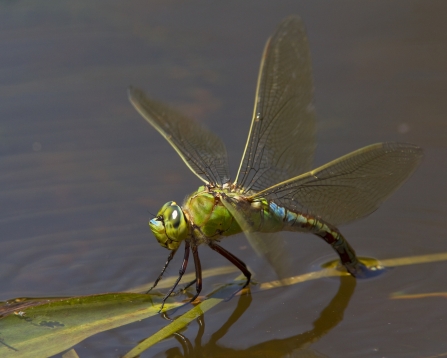The driest weeks for parts of England since 1935 have left nature under pressure with wildfires devastating landscapes, habitats left parched, and wildlife endangered by concentrated levels of pollutants in low-flowing rivers.
The Wildlife Trusts are extremely concerned about the impacts on natural areas – in particular, on rivers, wetlands, and streams – and are calling on the Government to introduce a suite of measures:
- Set a fixed target under the Environment Act for reducing water use, and require the installation of meters to ensure there is enough water in rivers for nature and society
- Ensure that developers, farmers, and water firms significantly reduce pollution by:
- Investigating and penalising water companies for illegal discharges of sewage
- Enforcing rules to protect rivers from agricultural pollution
- Ensuring that new building developments help to reduce pollution, rather than only being required not to make things worse
- Bring forward ambitious farming support schemes that reduce water pollution from fertilisers and pesticides, tackle soil erosion, and restore hedgerows and wetlands
- Set out specific objectives to help nature cope with drought, fire, and flooding in the next set of UK national climate adaptation programmes
- Reinstate climate change adaptation support services for land managers, including funding to help regulate water flows to cope with floods and drought
Ali Morse, water policy manager for The Wildlife Trusts, says:
“Nature is really struggling with extreme weather, and we need to act now to ensure our parched landscapes and rivers – the natural environment that provides us with food and water – are more resilient in the future. It is critical to create more space for nature to keep land from drying out and give support to landowners for projects, such as beaver releases, that help ecosystems to recover.
“Water bosses should unite and impose a country-wide hosepipe ban to reduce non-essential use and avoid the worst impacts of drought on rivers and wildlife, rather than relying on more damaging measures later. Water companies must also invest in water storage infrastructure, tackle leaks, and improve water efficiency – it’s a scandal that so much water is wasted every day. Government must ensure that new homes are water-efficient and bring in universal water metering to help all customers limit their water use.”
Vast quantities of water are used and leaked every day
- Every day in England, 14,000,000,000 (fourteen billion) litres of water are taken from the environment and put into supply by water companies. That’s equivalent to taking all the water that flows past Teddington on the River Thames each day, three times over.
- Almost 2,400 million litres of the water abstracted (extracted for people to use) is lost to leakage every day. Around a fifth is used to supply non-household premises (businesses, schools, industry) and the remainder is used to supply domestic customers.
The Wildlife Trusts believe more action is needed to tackle leaks, and that water companies should help businesses and householders to waste less. Water companies should also improve capacity to store water when it is plentiful so that less is extracted from rivers – particularly in times of drought when nature needs it most.

